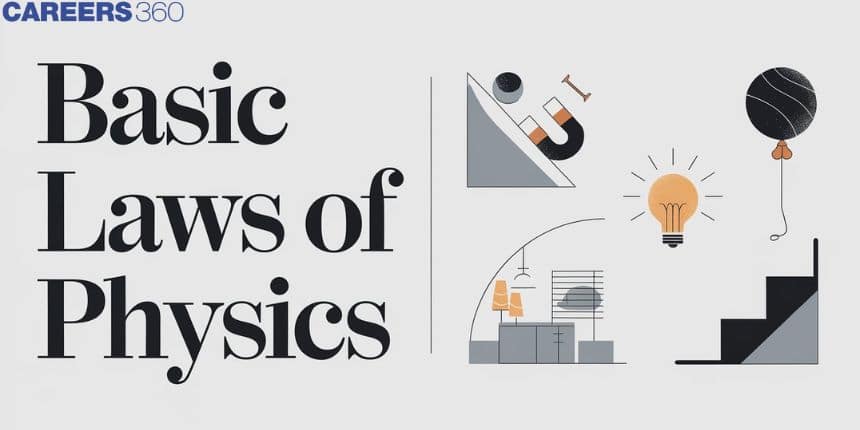Basic Laws of Physics - A Complete Guide
Physics is a branch of Science, where the occurrence of anything (Physical, Mechanical, Chemical) is governed by principles, deduced either experimentally or theoretically. Physics is the study of the reason or cause of any changes. Its study includes vast variations ranging from small atomic structures to ever-expanding universes. Every creature has experienced the effects of any laws explained in Physics in their life, so it's become very important to study and understand life governing “Fundamentals of Physics”. In this introductory chapter, we will study the Principles of Physics, and observe all laws of physics and their resemblance to our daily lives. We will study basic Physics and the nature of Physical laws.
JEE Main/NEET 2027: Physics Important Formulas for Class 10
NEET 2025: Mock Test Series | Syllabus | High Scoring Topics | PYQs
JEE Main: Study Materials | High Scoring Topics | Preparation Guide
JEE Main: Syllabus | Sample Papers | Mock Tests | PYQs
- What are Laws?
- Principles of Physics
- Important Laws of Physics Class 12
- How Laws are Formulated?
- Summary

What are Laws?
It is a conclusion drawn from past references of scientific experiments and observation. These laws are being continuously checked or they are being under evaluation for proper validation. Broadly speaking study of Physics has been classified as:
- Classical Physics
- Atomic Physics
Principles of Physics
Any laws that we study in Physics are governed by its principles. According to Physics the physical laws of matter, energy and the fundamental forces of nature govern the interactions between different entities.
|
Related Topics, |
Important Laws of Physics Class 12
Here, we will see some basic physics laws for which they exist in our surroundings.
1. Newton’s laws of motion
The three Newton's laws of motion are:
- The first Law of motion: An object remains at rest or of uniform motion unless compelled by an external force
$F=0 \Rightarrow constant $
- Second law of motion: The force acting on an object is equal to the product of its mass and acceleration.
$F=m a$
- Third law of motion: for every action, there is an equal and opposite reaction.
$
F_{\text {action }}=-F_{\text {reaction }}
$
2. Universal Law Of Gravitation
Newton's law of gravitation states that the attractive force between two masses is proportional to the product of their masses and inversely proportional to the square of the distance between them.
$ F=G \frac{m_1 m_2}{r^2}$
3. Law of Conservation Of Energy
The conservation of energy law explains that energy can neither be destroyed nor created and can only be transformed from one form to another form.
$
E_{\text {total }}=\text { constant }
$
4. Archimedes Principles
The Archimedes principle states that the object immersed in a fluid experiences a buoyant force which is equal to the fluid's weight displaced by the object.
$
F_b=\rho V g
$
5. Faraday’s laws
Faraday's law states that induced electromotive force in a closed circuit is proportional to the rate of change of magnetic flux in that circuit.
$
\mathcal{E}=-\frac{d \Phi_B}{d t}
$
6. Laws of Thermodynamics
First law of thermodynamics: Change in internal energy is equal to the difference of heat added from work done by the system.
$
\Delta U=Q-W
$
The second law of thermodynamics: In a cyclic process the entropy never decreases
$
\Delta S \geq 0
$
7. Heisenberg's Uncertainty Principle
It is impossible to precisely predict the momentum and position of a particle.
$
\Delta x \Delta p \geq \frac{\hbar}{2}
$
8. Conservation Of Momentum
The law of conservation of momentum states that the total momentum of an isolated system remains constant if there is no external force applied.
$
m_1 v_1+m_2 v_2=\text { constant }
$
9. Ohm's Law
Ohm's law states that current through a conductor is directly proportional to the product of voltage and resistance.
$
V=I R
$
10. Coulomb's Law
The force between two charges is directly proportional to the product of their charges and inversely proportional to the square of the distance bet. This is called Coulomb's law.
$
F=k \frac{q_1 q_2}{r^2}
$
Apart from the above-mentioned basic laws of physics, there are numerous laws left behind.
How Laws are Formulated?
For any assumptions to be formulated as Laws, it should follow:
- Must exist in confined (given) Space and Time.
- Conservative in the state of quantity.
- True, and must hold verification under specified condition
- Must be derived in simplest form.
Nature of Physical laws
As we have studied before, laws are encapsulated by the conclusion drawn from past references and their universal acceptance.
Summary
This article gives an overview about what are the laws of physics, the principles of physics, how laws are formulated, the physics important laws, and the nature of physics laws. In this article, we have discussed the explanation and equation of some important physics laws.
Frequently Asked Questions (FAQs)
For a laws to be formulated, it has different ways:
Laws derived from approximations
Laws derived from the derivations
Laws derived from Mathematical concepts
Galileo Galilei
Sir Isaac Newton
ప్రాథమిక చట్టాలు
After the experimental observations, they are deduced and derived. In this way physics laws are made.
Also Read
28 Nov'24 03:24 PM
27 Nov'24 01:07 PM
25 Nov'24 12:14 AM
24 Sep'24 06:24 PM
05 Sep'24 03:57 PM